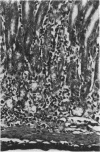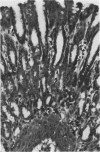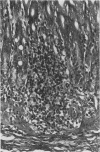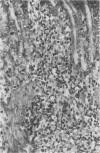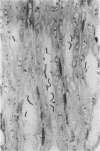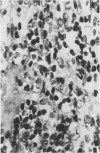Abstract
The gastric spirillum Helicobacter felis, originally isolated from the cat stomach, colonizes the stomachs of germfree rats. Studies were designed to examine the pathological and serological responses of germfree rats inoculated orally with H. felis. At 2 weeks postinoculation, the gastric mucosa of germfree rats had lymphocytes and eosinophils scattered in small foci throughout the subglandular region of the antrum. Small numbers of lymphocytes were present in the subglandular portion of the antral mucosa that focally extended through the lamina propria towards the luminal surface. Eight weeks postinoculation, the inflammation was confined to the antrum. It was characterized by increased numbers of lymphocytes and eosinophils in the subglandular areas, with focal aggregates of lymphocytes in the submucosa. Some lymphoid aggregates extended from the submucosa through the muscularis mucosa and lamina propria to the luminal surface. H. felis was demonstrated with the Warthin-Starry stain, bacterial culture, and urease assay, particularly in the antrum. H. felis also produced a significant immunoglobulin G antibody titer at 2, 4, and 8 weeks postinoculation as well as a transitory immunoglobulin M response at 2 to 4 weeks postinoculation. Contact control rats were not infected, inferring that fecal-oral spread of H. felis did not occur.
Full text
PDF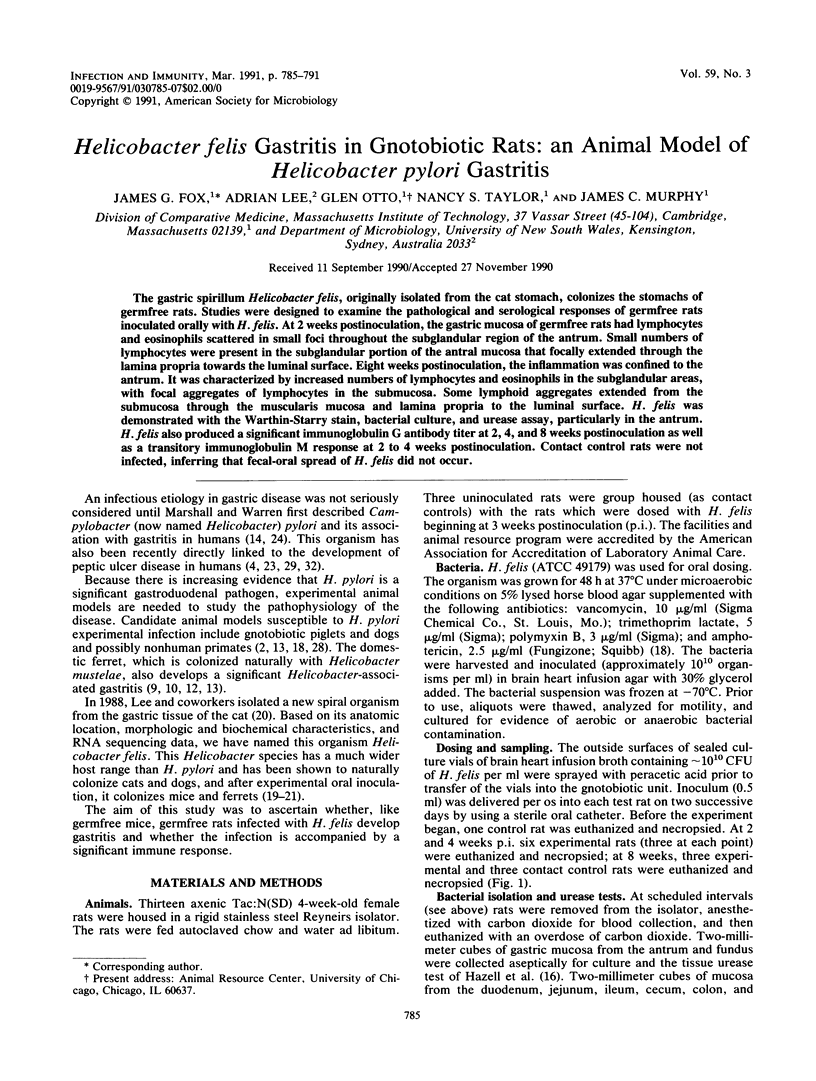
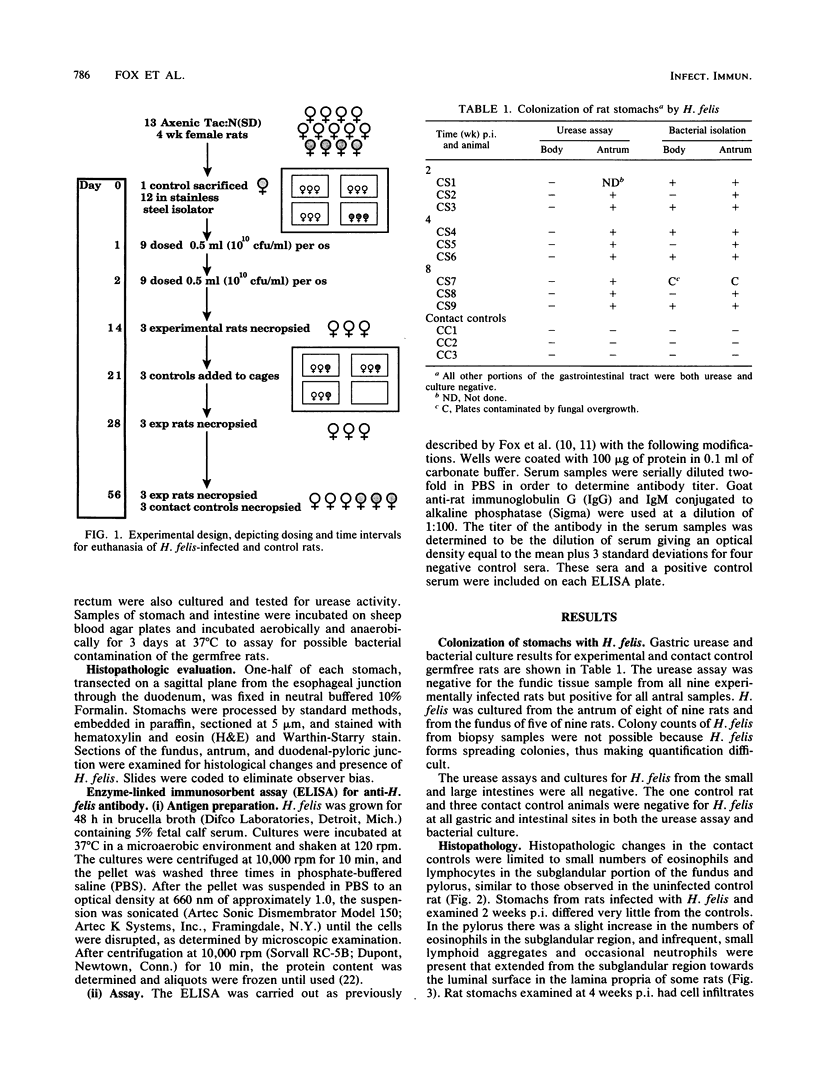
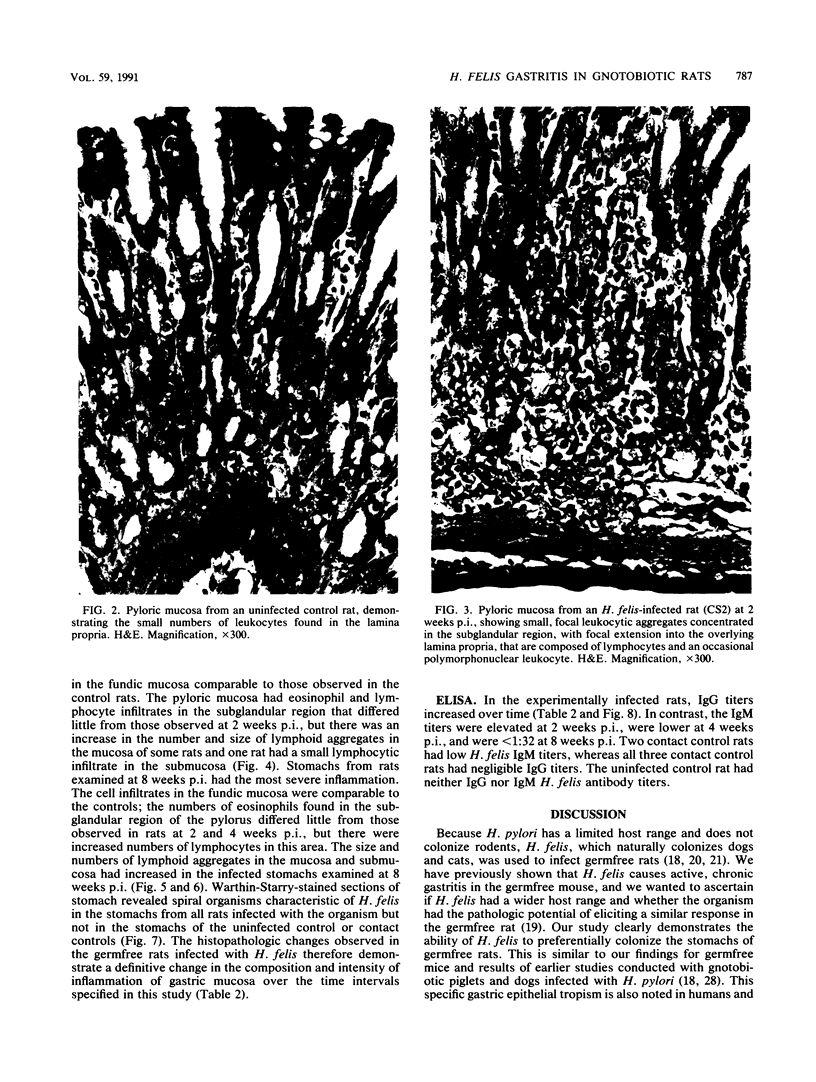
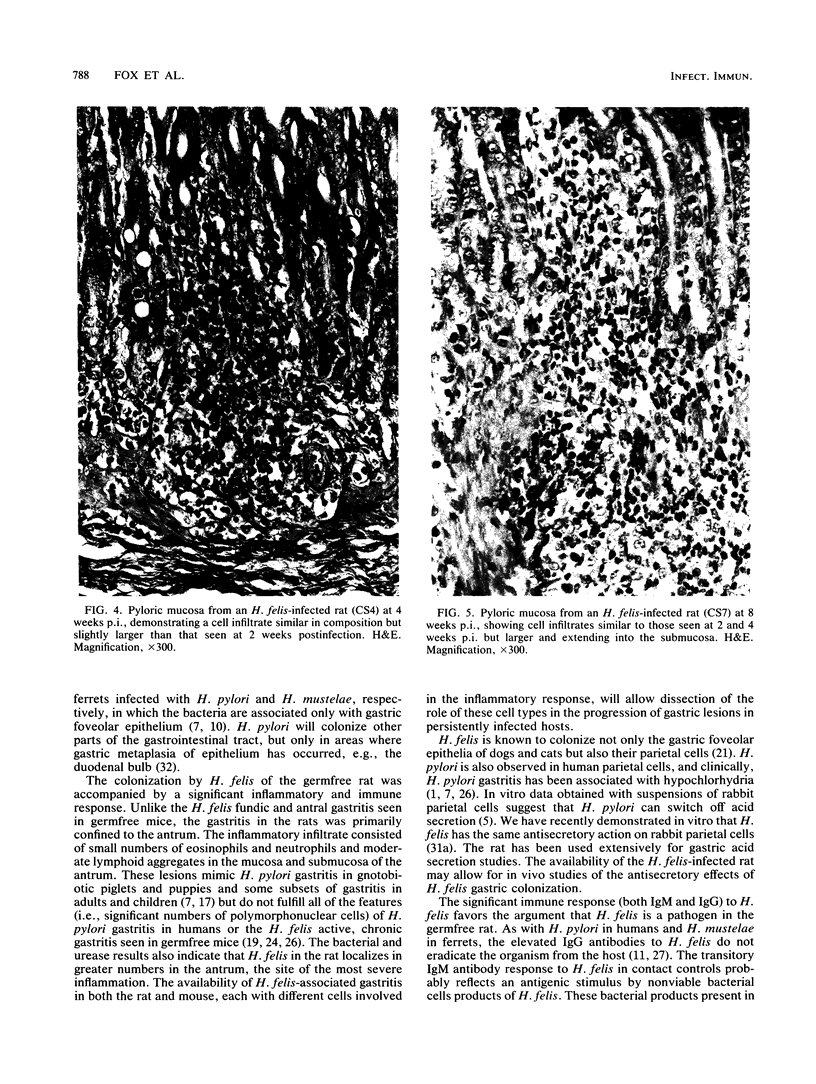
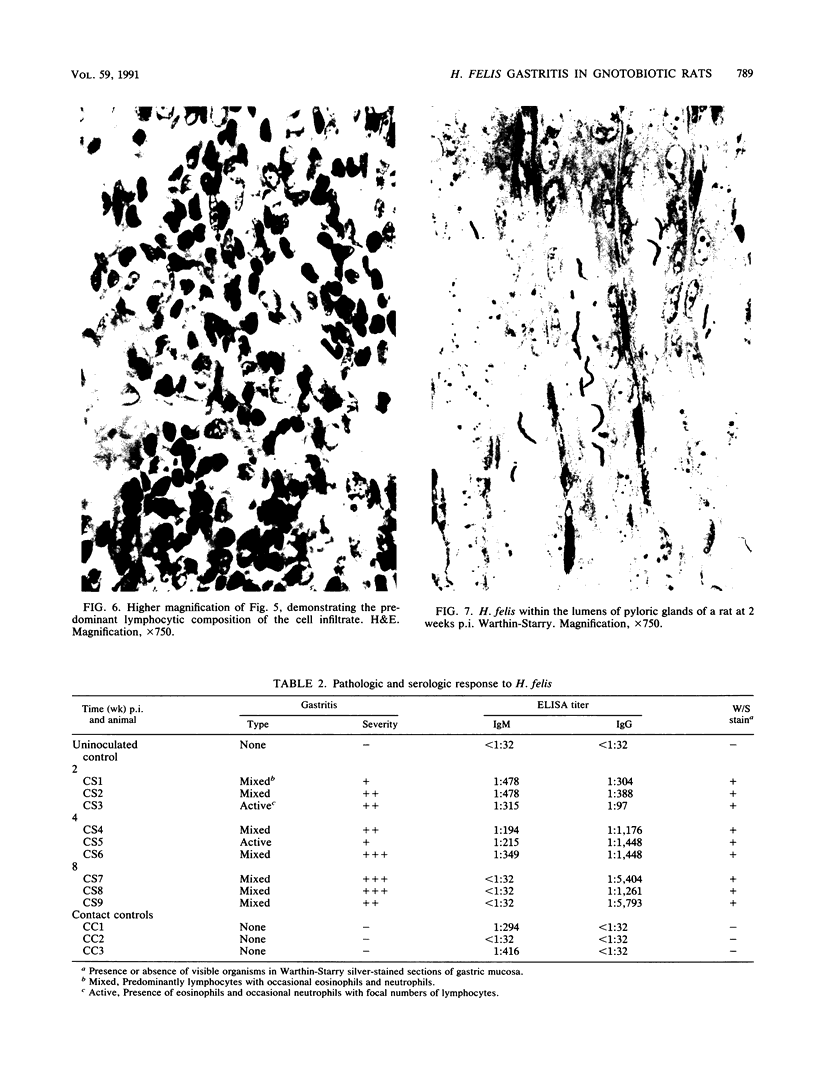
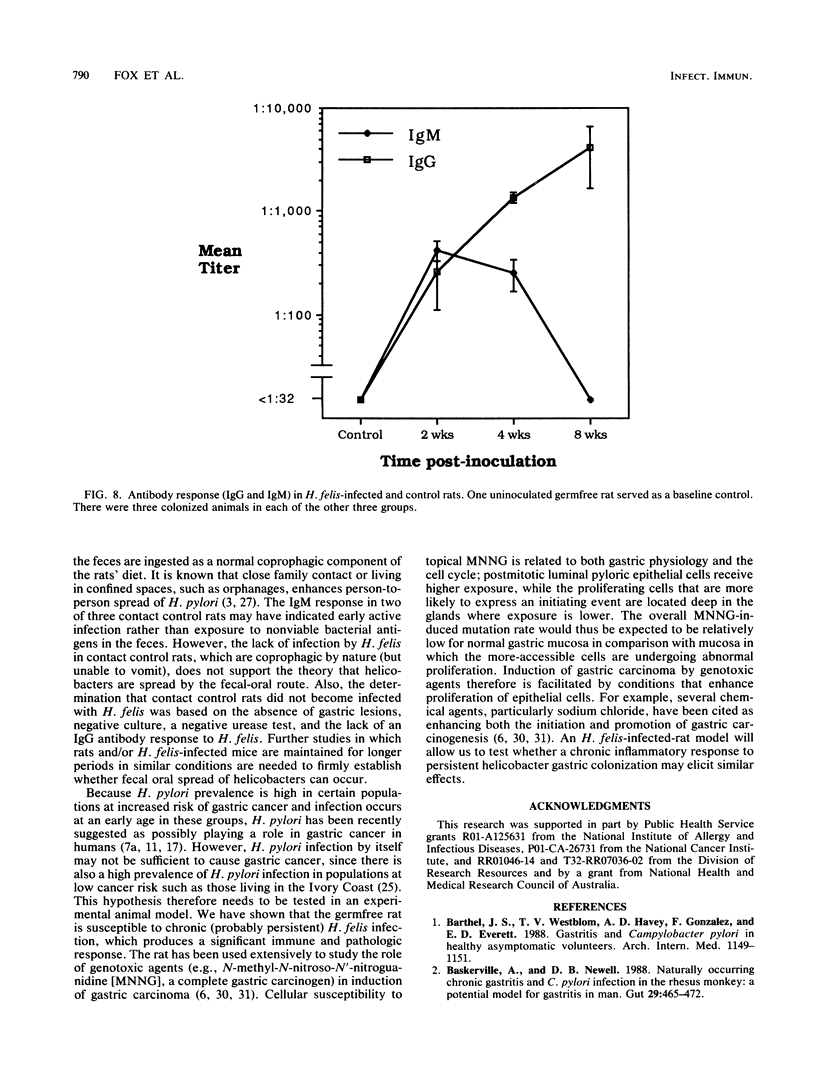
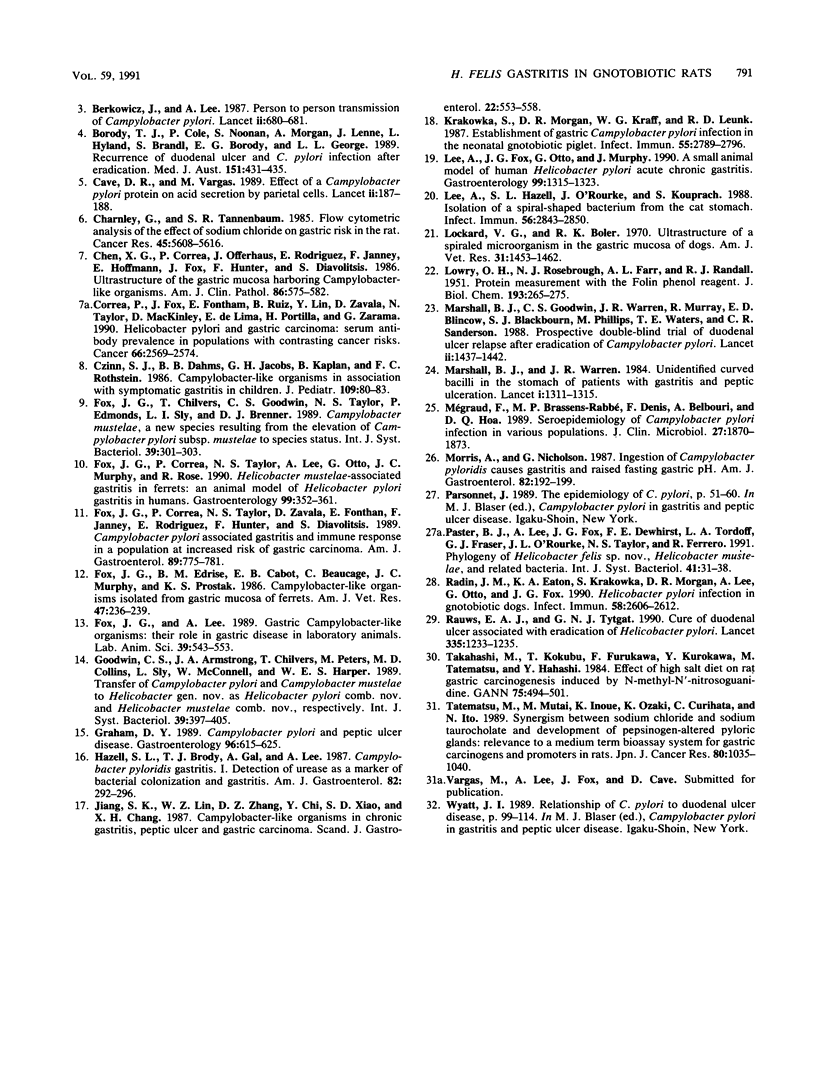
Images in this article
Selected References
These references are in PubMed. This may not be the complete list of references from this article.
- Barthel J. S., Westblom T. U., Havey A. D., Gonzalez F., Everett E. D. Gastritis and Campylobacter pylori in healthy, asymptomatic volunteers. Arch Intern Med. 1988 May;148(5):1149–1151. [PubMed] [Google Scholar]
- Baskerville A., Newell D. G. Naturally occurring chronic gastritis and C pylori infection in the rhesus monkey: a potential model for gastritis in man. Gut. 1988 Apr;29(4):465–472. doi: 10.1136/gut.29.4.465. [DOI] [PMC free article] [PubMed] [Google Scholar]
- Berkowicz J., Lee A. Person-to-person transmission of Campylobacter pylori. Lancet. 1987 Sep 19;2(8560):680–681. doi: 10.1016/s0140-6736(87)92458-5. [DOI] [PubMed] [Google Scholar]
- Borody T. J., Cole P., Noonan S., Morgan A., Lenne J., Hyland L., Brandl S., Borody E. G., George L. L. Recurrence of duodenal ulcer and Campylobacter pylori infection after eradication. Med J Aust. 1989 Oct 16;151(8):431–435. doi: 10.5694/j.1326-5377.1989.tb101251.x. [DOI] [PubMed] [Google Scholar]
- Cave D. R., Vargas M. Effect of a Campylobacter pylori protein on acid secretion by parietal cells. Lancet. 1989 Jul 22;2(8656):187–189. doi: 10.1016/s0140-6736(89)90372-3. [DOI] [PubMed] [Google Scholar]
- Charnley G., Tannenbaum S. R. Flow cytometric analysis of the effect of sodium chloride on gastric cancer risk in the rat. Cancer Res. 1985 Nov;45(11 Pt 2):5608–5616. [PubMed] [Google Scholar]
- Chen X. G., Correa P., Offerhaus J., Rodriguez E., Janney F., Hoffmann E., Fox J., Hunter F., Diavolitsis S. Ultrastructure of the gastric mucosa harboring Campylobacter-like organisms. Am J Clin Pathol. 1986 Nov;86(5):575–582. doi: 10.1093/ajcp/86.5.575. [DOI] [PubMed] [Google Scholar]
- Correa P., Fox J., Fontham E., Ruiz B., Lin Y. P., Zavala D., Taylor N., Mackinley D., de Lima E., Portilla H. Helicobacter pylori and gastric carcinoma. Serum antibody prevalence in populations with contrasting cancer risks. Cancer. 1990 Dec 15;66(12):2569–2574. doi: 10.1002/1097-0142(19901215)66:12<2569::aid-cncr2820661220>3.0.co;2-i. [DOI] [PubMed] [Google Scholar]
- Czinn S. J., Dahms B. B., Jacobs G. H., Kaplan B., Rothstein F. C. Campylobacter-like organisms in association with symptomatic gastritis in children. J Pediatr. 1986 Jul;109(1):80–83. doi: 10.1016/s0022-3476(86)80579-0. [DOI] [PubMed] [Google Scholar]
- Fox J. G., Correa P., Taylor N. S., Lee A., Otto G., Murphy J. C., Rose R. Helicobacter mustelae-associated gastritis in ferrets. An animal model of Helicobacter pylori gastritis in humans. Gastroenterology. 1990 Aug;99(2):352–361. doi: 10.1016/0016-5085(90)91016-y. [DOI] [PubMed] [Google Scholar]
- Fox J. G., Correa P., Taylor N. S., Zavala D., Fontham E., Janney F., Rodriguez E., Hunter F., Diavolitsis S. Campylobacter pylori-associated gastritis and immune response in a population at increased risk of gastric carcinoma. Am J Gastroenterol. 1989 Jul;84(7):775–781. [PubMed] [Google Scholar]
- Fox J. G., Edrise B. M., Cabot E. B., Beaucage C., Murphy J. C., Prostak K. S. Campylobacter-like organisms isolated from gastric mucosa of ferrets. Am J Vet Res. 1986 Feb;47(2):236–239. [PubMed] [Google Scholar]
- Fox J. G., Lee A. Gastric campylobacter-like organisms: their role in gastric disease of laboratory animals. Lab Anim Sci. 1989 Nov;39(6):543–553. [PubMed] [Google Scholar]
- Graham D. Y. Campylobacter pylori and peptic ulcer disease. Gastroenterology. 1989 Feb;96(2 Pt 2 Suppl):615–625. doi: 10.1016/s0016-5085(89)80057-5. [DOI] [PubMed] [Google Scholar]
- Hazell S. L., Borody T. J., Gal A., Lee A. Campylobacter pyloridis gastritis I: Detection of urease as a marker of bacterial colonization and gastritis. Am J Gastroenterol. 1987 Apr;82(4):292–296. [PubMed] [Google Scholar]
- Jiang S. J., Liu W. Z., Zhang D. Z., Shi Y., Xiao S. D., Zhang Z. H., Lu D. Y. Campylobacter-like organisms in chronic gastritis, peptic ulcer, and gastric carcinoma. Scand J Gastroenterol. 1987 Jun;22(5):553–558. doi: 10.3109/00365528708991897. [DOI] [PubMed] [Google Scholar]
- Krakowka S., Morgan D. R., Kraft W. G., Leunk R. D. Establishment of gastric Campylobacter pylori infection in the neonatal gnotobiotic piglet. Infect Immun. 1987 Nov;55(11):2789–2796. doi: 10.1128/iai.55.11.2789-2796.1987. [DOI] [PMC free article] [PubMed] [Google Scholar]
- LOWRY O. H., ROSEBROUGH N. J., FARR A. L., RANDALL R. J. Protein measurement with the Folin phenol reagent. J Biol Chem. 1951 Nov;193(1):265–275. [PubMed] [Google Scholar]
- Lee A., Fox J. G., Otto G., Murphy J. A small animal model of human Helicobacter pylori active chronic gastritis. Gastroenterology. 1990 Nov;99(5):1315–1323. doi: 10.1016/0016-5085(90)91156-z. [DOI] [PubMed] [Google Scholar]
- Lee A., Hazell S. L., O'Rourke J., Kouprach S. Isolation of a spiral-shaped bacterium from the cat stomach. Infect Immun. 1988 Nov;56(11):2843–2850. doi: 10.1128/iai.56.11.2843-2850.1988. [DOI] [PMC free article] [PubMed] [Google Scholar]
- Lockard V. G., Boler R. K. Ultrastructure of a spiraled microorganism in the gastric mucosa of dogs. Am J Vet Res. 1970 Aug;31(8):1453–1462. [PubMed] [Google Scholar]
- Marshall B. J., Goodwin C. S., Warren J. R., Murray R., Blincow E. D., Blackbourn S. J., Phillips M., Waters T. E., Sanderson C. R. Prospective double-blind trial of duodenal ulcer relapse after eradication of Campylobacter pylori. Lancet. 1988 Dec 24;2(8626-8627):1437–1442. doi: 10.1016/s0140-6736(88)90929-4. [DOI] [PubMed] [Google Scholar]
- Marshall B. J., Warren J. R. Unidentified curved bacilli in the stomach of patients with gastritis and peptic ulceration. Lancet. 1984 Jun 16;1(8390):1311–1315. doi: 10.1016/s0140-6736(84)91816-6. [DOI] [PubMed] [Google Scholar]
- Morris A., Nicholson G. Ingestion of Campylobacter pyloridis causes gastritis and raised fasting gastric pH. Am J Gastroenterol. 1987 Mar;82(3):192–199. [PubMed] [Google Scholar]
- Mégraud F., Brassens-Rabbé M. P., Denis F., Belbouri A., Hoa D. Q. Seroepidemiology of Campylobacter pylori infection in various populations. J Clin Microbiol. 1989 Aug;27(8):1870–1873. doi: 10.1128/jcm.27.8.1870-1873.1989. [DOI] [PMC free article] [PubMed] [Google Scholar]
- Paster B. J., Lee A., Fox J. G., Dewhirst F. E., Tordoff L. A., Fraser G. J., O'Rourke J. L., Taylor N. S., Ferrero R. Phylogeny of Helicobacter felis sp. nov., Helicobacter mustelae, and related bacteria. Int J Syst Bacteriol. 1991 Jan;41(1):31–38. doi: 10.1099/00207713-41-1-31. [DOI] [PubMed] [Google Scholar]
- Radin M. J., Eaton K. A., Krakowka S., Morgan D. R., Lee A., Otto G., Fox J. Helicobacter pylori gastric infection in gnotobiotic beagle dogs. Infect Immun. 1990 Aug;58(8):2606–2612. doi: 10.1128/iai.58.8.2606-2612.1990. [DOI] [PMC free article] [PubMed] [Google Scholar]
- Rauws E. A., Tytgat G. N. Cure of duodenal ulcer associated with eradication of Helicobacter pylori. Lancet. 1990 May 26;335(8700):1233–1235. doi: 10.1016/0140-6736(90)91301-p. [DOI] [PubMed] [Google Scholar]
- Takahashi M., Kokubo T., Furukawa F., Kurokawa Y., Hayashi Y. Effects of sodium chloride, saccharin, phenobarbital and aspirin on gastric carcinogenesis in rats after initiation with N-methyl-N'-nitro-N-nitrosoguanidine. Gan. 1984 Jun;75(6):494–501. [PubMed] [Google Scholar]
- Tatematsu M., Mutai M., Inoue K., Ozaki K., Furihata C., Ito N. Synergism between sodium chloride and sodium taurocholate and development of pepsinogen-altered pyloric glands: relevance to a medium-term bioassay system for gastric carcinogens and promoters in rats. Jpn J Cancer Res. 1989 Nov;80(11):1035–1040. doi: 10.1111/j.1349-7006.1989.tb02255.x. [DOI] [PMC free article] [PubMed] [Google Scholar]



